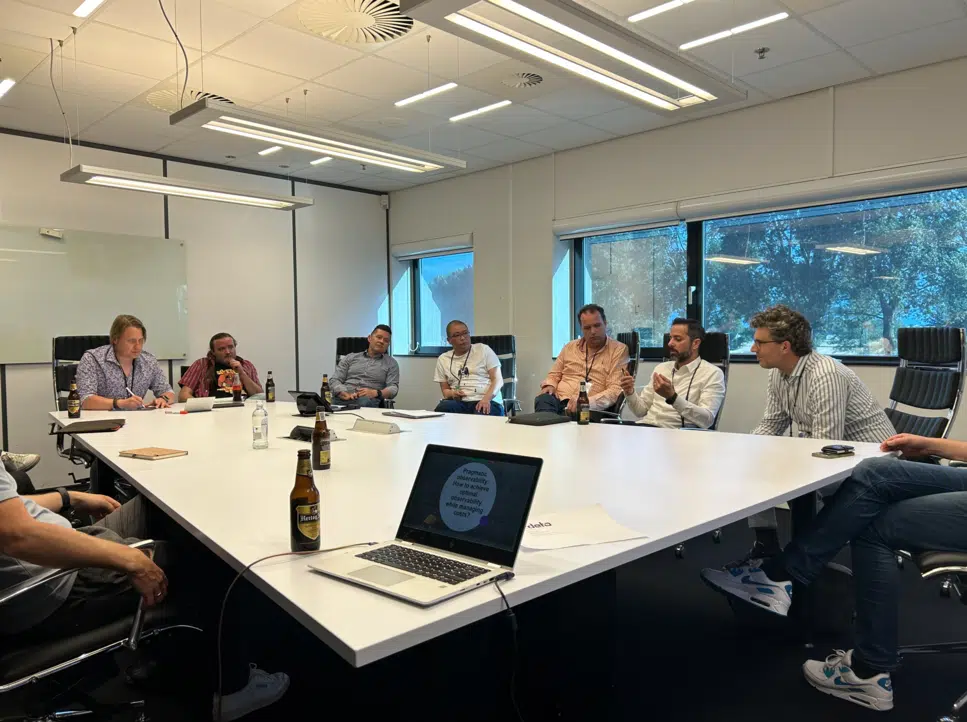We recently spoke with Primrose Matambo, Talent Manager at Beamly as part of our #TalentQA series where we interview leaders in talent management and recruitment from a range of businesses from tech startups to well-known fashion brands.
Primrose talks about the work that Beamly does, the challenges of recruiting technical talent and discusses the ways in which the increasingly digital landscape will continue to affect and influence the recruitment industry.
Third Republic (TR): To kick us off, could you explain a bit about the innovative work that Beamly does?
Primrose Matambo (PM): Basically we’re a marketing firm that uses elements of marketing science, creative, media and engineering to provide an end-to-end marketing service to our customers. Most of our team is based in London but we also have offices in Paris, New York, Darmstadt, Miami, Sao Paolo and Sydney. The purpose of our business is to create engaging campaigns, best in class websites and innovative digital products for the future.
TR: What does your role involve and what challenges have you experienced when recruiting talent at Beamly?
PM: As the Talent Manager, I do everything from sourcing to recruiting and I am also involved in the on-boarding process as well.
One of the key challenges I have encountered, and continue to encounter, is sourcing and engaging high-quality talent. The nature of what Beamly does is constantly changing, evolving and growing, so when we’re looking for people to join the team, I think it’s important to look for someone who’s going to be able to grow into the role and along with Beamly. These people might not tick all of the boxes but so long as they have the ability to grow with the businesses, it’s likely they will perform well.
Attracting top talent, our business is continually changing and growing. Some specifics, with engineering, etc.
TR: How do you go about overcoming these challenges?
PM: I’m quite lucky at Beamly as I work with great hiring managers who own the process. We work really closely together and make sure that we’re on the same page when it comes to the technical talent that we’re looking for. This really helps to overcome the challenges we might face. It’s a great partnership and something I think is really important in all businesses.
TR: What sort of strategies do you adopt in terms of attracting, engaging and securing technical talent at Beamly?
PM: We operate a generous referral scheme. Encouraging our employees to recommend their peers is important to us because this way we receive a lot of relevant candidates. It also drives overheads down and speeds up the recruitment cycle. Unsurprisingly, we’ve had a lot of new hires come out of this initiative.
Of course, we also use more traditional methods such as Indeed, LinkedIn. Saying that we’ve moved away from using LinkedIn so much because we’re finding that candidates are moving off of LinkedIn due to the amount of InMails they’re receiving on a daily basis. We’re finding platforms like Glassdoor and Hired are more fruitful in terms of relevant and quality talent.
Once we invite someone to interview we try to make the process as easy as possible because we know that ultimately, what matters the most is candidate experience and engagement. If you can’t engage candidates and keep them interested in the role then you’re guaranteed to lose them to competitors.
TR: Do you think that social media is an important part of talent sourcing or do you think there are other, more effective ways to source talent?
PM: Definitely, I have had candidates tell me that they have specifically applied for a role because of something they saw on one of our social media pages. I think it’s really important to maintain social media pages as part of the internal recruitment process.
Company social media pages are a great way of engaging candidates as it provides an insight into the company and the culture. As we all know, the technology market is so competitive, so as much as you’re interviewing candidates, it’s also important to think about them interviewing you too. They want to make sure it’s the right company for them to join.
TR: Have you recognised a change in candidate behaviours throughout your time in the industry?
PM: I think it depends on the role, for example, Engineers are in such high demand at the moment that they don’t have to be actively looking for roles – I think this is one of the most difficult areas to recruit in.
Saying this, I would say that technical candidates in general definitely have more choice now and more of a say. Which means they are becoming increasingly passive when it comes to looking for work. So, it’s important now more than ever for recruiters to be at the top of their game and engaging talent that isn’t actively on the market.
TR: How should businesses react to the changes in candidate behaviours?
PM: I think the key thing is for businesses to listen to what candidates and current employees have to say. It’s important to adapt based on what your people want. Being flexible to try new things and offer the best environment you can. Candidates are much more focused on company culture now.
TR: Would you say that being a recruiter in today’s highly digital age requires more advanced relationship and people management skills?
PM: Yes, I definitely agree with this because as much as we’re increasingly becoming digital, there are always people on the other side. Recruitment is a people-based business, so we can definitely use digital to make us more efficient, however, it will always be about helping people realise their dream – and in my opinion, this process can’t be fully digitised. When people feel a connection or build a relationship with someone they trust, it’s more likely they’ll stay.
TR: Looking forward, do you think the rise in digital and technology will continue to influence and alter the industry?
PM: Yes, as we advance there are more tools that are simplifying our lives and making them easier. The introduction of these platforms means that we’ll spend less time on administrative tasks. Being able to automate processes will allow recruiters more time in their day to engage with people and build those essential relationships.
It will definitely require a changing and adapting of skillsets but in the long run, I think technology will make the industry a lot more effective.
TR: We live in an increasingly digital world; how can recruiters keep up to date with the ever-evolving technology and techniques in the industry?
PM: I think it’s important in recruitment and any profession to keep learning. No question is silly and if you don’t know something ask. If you don’t keep adapting and learning you’ll likely get left behind. I’m also a massive advocate for networking and attending conferences and events – it’s another great way of learning. The more you know, the better and more informed decisions you can make.
If you’d like to take part in our #TalentQA series or you’re looking to source technical talent, get in touch today!




